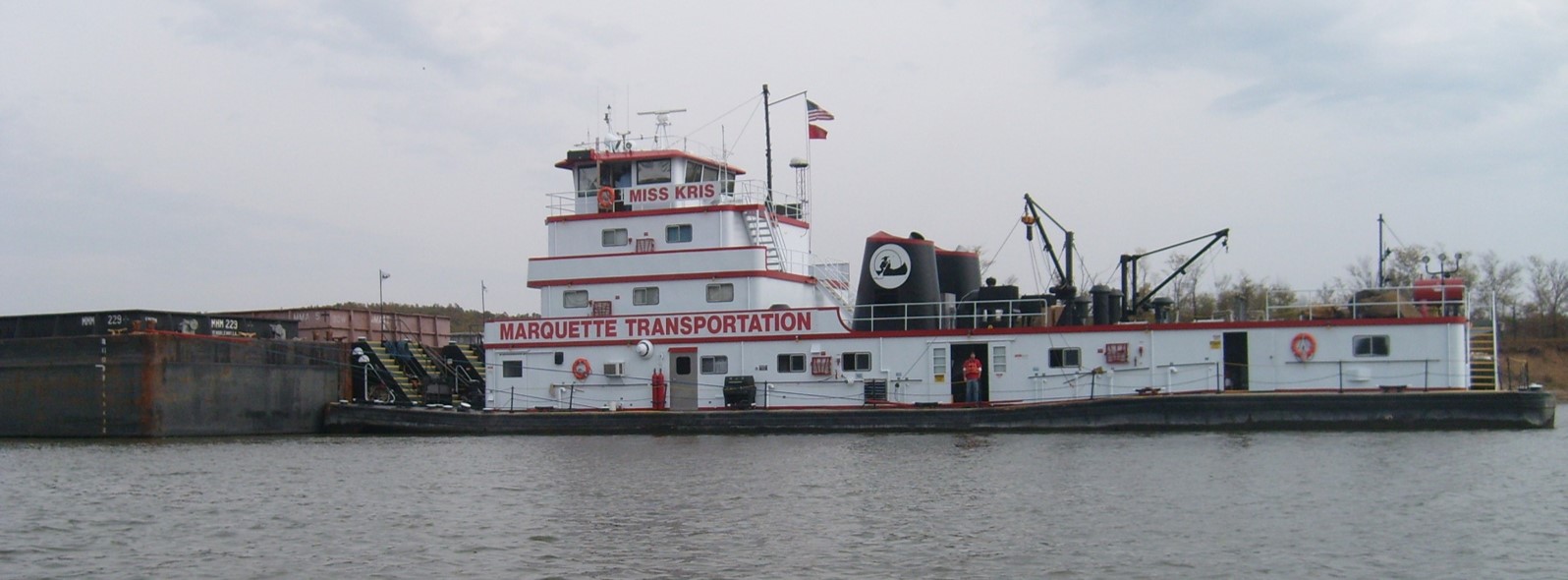
July 17, 2018
Concerned about the health of towboat workers, professor works to bring change
 CARBONDALE, Ill. — The tugboat, towboat and barge industry is subtly, yet deeply, involved in the stability of the American economy. Every year, over 760 million tons of cargo are moved on river waterways, supporting over 300,000 jobs nationwide. But for those working on these vessels, health risks have become a serious concern.
CARBONDALE, Ill. — The tugboat, towboat and barge industry is subtly, yet deeply, involved in the stability of the American economy. Every year, over 760 million tons of cargo are moved on river waterways, supporting over 300,000 jobs nationwide. But for those working on these vessels, health risks have become a serious concern.
When Dawn Null, assistant professor of human nutrition and dietetics at Southern Illinois University Carbondale, first learned the United States Coast Guard was considering a move to tighten the physical requirements for wheelhouse officers on brown-water towboats, she quickly discovered a potential problem.
Boat conditions may contribute to weight gain
Brown-water mariners typically work 21-30 days at a time, and then are off the same amount of time. Most occupations on the boat work split shifts with six hours on, six hours off twice daily; preventing them from getting the recommended eight hours of sleep at one time, Null said.
Additionally, room on the boat is cramped, making it challenging for the crew to exercise outside of work duties. While the deckhands are typically more active on the job, captains and pilots are limited to navigating the vessel in the tight quarters of the wheelhouse.
Concerned by these features, Null also examined the foods that were served on these riverboats. While generally well-liked, the food was not always cooked with health in mind. The crew often consumed large amounts of food, yet, did not work those extra calories off. Null collected over 200 surveys, interviews and body measurement sessions, finding that the combination of large portion sizes and inadequate exercise was leading to unwanted weight gain among crew members.
“My study shows that nearly all participants were considered overweight or obese based on their body mass index (BMI),” Null said.
Of the 92.9% considered overweight or obese, Null discovered that 62% were considered obese based on their BMI.
“The constrictive environment of the towboat, great all-you-can-eat foods, split shifts, and inadequate physical activity creates a perfect storm resulting in an obesogenic environment,” Null said.
Concern for overall health
High BMI scores have been directly related to a host of other physical and mental health issues, causing concerns for the long-term quality of life for these workers. Yet, not only are they at risk for potential personal health problems, but these health conditions also present a danger to others. The tow boats and barges often carry thousands of tons of cargo, and if a captain were to have a serious health crisis, it could be catastrophic.
Additionally, Null and research colleagues from Yale School of Medicine, are in the process of designing a study to examine mental health issues that contribute to the health of the mariners.
“Men and women working on the river do not necessarily have more mental health issues. However, we know job stress may contribute to serious health problems as well as mental health disorders,” Null said. “We are taking a proactive approach to recognizing potential job stressors in order to identify interventions and resources that would help the mariners maintain good mental health.”
The team is working to understand the root issues, and then develop a helpful solution.
There are known correlations between chronic disease and mental health, along with correlations between physical activity and mental health, Null explained. By examining the variety of determinants, the goal is to build an environment that is more conducive to exercise, better sleep, healthier eating habits and support for mental health.
Unable to meet proposed physical standards
Null first recognized this under-researched area when she heard about the potential change in policy regarding the health requirements for wheelhouse officers.
The U.S. Coast Guard monitors the physical requirements for captains and pilots, ensuring that all members are able to effectively and safely do their jobs. One of the standards relates to the BMI of the wheelhouse officers, which was set at a maximum of 40.
A BMI of 40 is considered morbidly obese. When the Coast Guard considered dropping that standard, it caused serious concern as the industry was already suffering from a shortage of pilots and captains.
Taking steps toward change
Null’s research brought to light many issues, and now, she has started the process of bringing change. While she continues to collect data on the overall conditions of the workers, along with finding potential solutions, she has already worked with companies to start making small changes.
She has partnered with a couple of companies to do consulting regarding the eating behaviors of the crew. By making small changes, Null believes a lot can be done to improve the health of these individuals.
“The companies are really interested in doing everything they can to ensure a healthy crew, because they know it is a difficult environment to work in,” Null said. “It’s a win-win for them if their men and women stay mentally and physically healthy, so they are very open to making changes that are feasible.”
Null and her colleagues continue to evaluate exactly what those changes could be and are examining how they can be implemented in the future.
